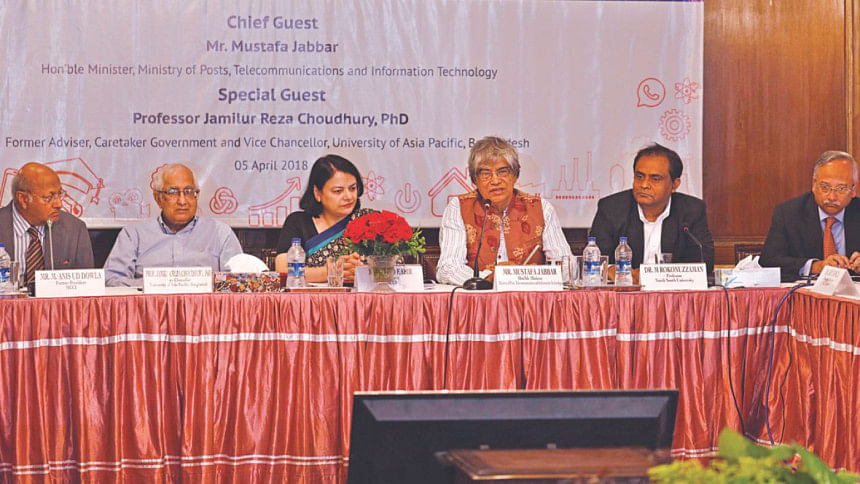Embrace technology to increase productivity

Bangladesh's productivity is much lower compared to its competitors because of slow adoption of technology, experts said.
Bangladesh needs the involvement of 142 people on average to export products worth $1 million whereas competitors require only a third of them to make the same quantity of shipment as the latter have adopted technology that raised productivity.
Currently, China needs only 48 people, India 59 and Vietnam 75 people to export $1 million worth of products, said Syed Nasim Manzur, managing director of Apex Footwear Ltd, referring to a study.
He said two decades ago Bangladesh required 545 people to send $1 million worth of products abroad.
“The country has evolved a lot since then, but we have miles to go to be competitive with our competitors,” he said.
“We need to change our production pattern and engage technology more to improve the situation,” the entrepreneur said at a discussion at the Metropolitan Chamber of Commerce and Industry, Dhaka (MCCI).
The chamber organised the event titled “Technology, innovation, and policy: How to proceed?”
Business leaders, academics and experts said Bangladesh will not be able to increase productivity without adopting the technology.
If technology is not embraced, the country will lose the competitiveness in the export markets, they said.
They said the government needs to adopt a policy on technology and innovation immediately and ensure effective collaboration between businesses and universities for better performance.
The fourth industrial revolution is knocking at the door and if Bangladesh fails to match the technological development the country will fail to keep pace with the world, speakers said.
Prof Jamilur Reza Choudhury, vice-chancellor of the University of Asia Pacific, said the country is very slow on adoption of technology which is pushing the country backward. “We are requesting the government to formulate a separate policy on technology uses and innovation with an action plan,” he said.
Choudhury urged the government to rely on local innovations and change the bureaucratic mentality of obtaining technological support from external sources.
In 2001, he along with a group suggested a model in order to develop hi-tech park but more than one and half decades have passed but the park is yet to be developed, he said.
Mustafa Jabbar, post and telecom minister, said the country has failed to develop an innovation culture and there is no value for innovation as everything is copied.
“To make use of the optimum potential, we need to change this culture and ensure the value of innovation,” he said.
Jabbar said Bangladesh is a unique country where people only value physical property which is one of the main barriers to flourish a knowledge-based society.
The minister emphasised improving educational quality and ensuring digitalisation of the education system.
“More and more advanced technology will hit the market. So, if the youth fail to adapt to this new trend they will have no clear goal and the whole country will suffer as a result.” Jabbar said the government has created an environment where digital devices are being assembled in the country.
These devices will hit the export markets within next two years, he said, adding that software exports stand at $800 million a year. Sonia Bashir Kabir, managing director of Microsoft Bangladesh, said the country needs to focus on edu-tech, agro-tech, fin-tech, and health-tech to reach the next level of development with the help of the fourth industrial revolution.
Kabir said Bangladesh is a huge market and developers and business entities need to think of buying software from local firms. Nihad Kabir, president of the MCCI, urged the government to change the taxation policies as there are taxes on imported digital products which are used to promote digitalisation in the country.
M Anis Ud Dowla, chairman of ACI Ltd, said they cannot show their innovation funds as expenses. As a result, the businesses have to pay taxes on such expenditure, he said. “We need to cope with the fourth industrial revolution. There is nothing to be afraid of. We should adopt this technological advancement.”
Anir Chowdhury, policy adviser to the a2i Programme under the Prime Minister's Office, said the private sector needs to take some initiatives to set up incubation centres in order to develop technology and solutions.

 For all latest news, follow The Daily Star's Google News channel.
For all latest news, follow The Daily Star's Google News channel. 



Comments